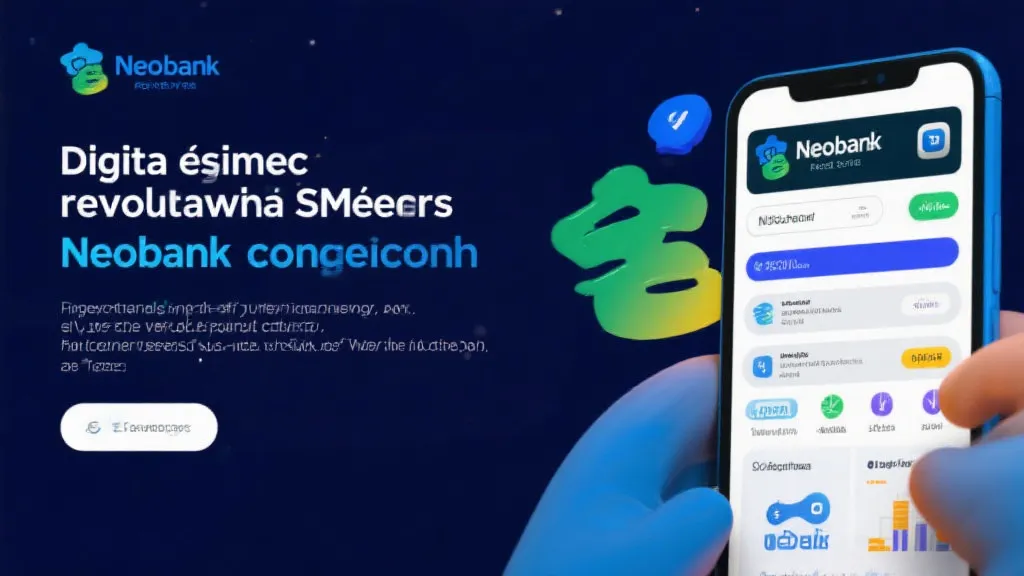This guide explores the innovative role of SME Neobanks in the digital financial landscape. SME Neobanks are digital-first, tech-driven banks offering streamlined banking solutions tailored for small to medium enterprises. Their offerings are reshaping traditional banking by providing efficient, cost-effective, and user-friendly services, aiming to meet the unique demands of SMEs.

In the evolving landscape of financial services, the emergence of SME Neobanks marks a pivotal shift towards digital-first banking solutions. Traditional banking systems have long faced criticism for their cumbersome processes and high fees, often proving challenging for small and medium-sized enterprises (SMEs) to navigate. SME Neobanks address these concerns by offering streamlined and tech-driven banking solutions tailored to the distinct needs of these businesses. Their innovative models not only simplify banking for SMEs but also empower them to thrive in an increasingly competitive environment.
As digitization permeates every facet of modern life, the expectation for accessible, on-demand services extends to banking. For SMEs, every minute spent grappling with banking inefficiencies can translate into lost opportunities. Traditional banks often require lengthy paperwork and extensive processing time, while SME Neobanks prioritize a frictionless user experience. With a deep understanding of the unique challenges faced by SMEs, these neobanks have harnessed technology to create user-friendly interfaces and efficient service models. The combination of lower fees, faster processing, and tailored solutions enables SMEs to redirect their focus from financial obstacles toward growth and innovation.
SME Neobanks primarily operate online, eliminating the need for physical branches, which in turn reduces operational costs. This model allows them to offer competitive rates and efficiency far surpassing traditional banks. Utilizing cutting-edge technology, these digital banks provide features such as fast account setup, robust mobile banking options, and seamless integrations with accounting software. These innovations facilitate better cash flow management and financial decision-making for SMEs, enabling them to focus on growth and innovation.
The shifts in banking preferences have prompted financial institutions to rethink their models. Traditional banks are now forced to enhance their digital services to retain clientele. SME Neobanks not only fill gaps left by conventional banks but also challenge them to innovate. As a result, SMEs today enjoy a variety of options tailored to their needs, whether that is expert advice through chat interfaces, rich data analytics for greater financial insight, or instant access to transactions through dedicated apps.
Additionally, the rise of open banking and APIs has propelled the growth of SME Neobanks. These technologies enable seamless data sharing between financial institutions and third-party applications, allowing SMEs to connect their banking services with other financial tools. By leveraging these connections, businesses can streamline their financial processes, automate workflows, and make informed decisions in real time. As technology continues to evolve and improve, SME Neobanks are expected to expand their services further, creating even more opportunities for SMEs to optimize their banking experience.
Traditional banks, with their extensive networks and resources, have long served as the backbone of business banking. However, they often bring stringent requirements and slower processing times. In contrast, SME Neobanks prioritize user experience and flexibility, offering faster service, personalized support, and tools that cater specifically to SME needs. Here's a comparative look at offerings from some major banks:
| Bank | Account Type | Bonus Condition | Bonus Amount |
|---|---|---|---|
| Bank of America | Personal Checking Account | Deposit $2,000 in direct deposits within 90 days | $200 |
| Chase Bank | Total Checking Account | Make one direct deposit of any amount within 90 days | $300 |
| Citibank | Regular Checking Account | Complete two direct deposits totaling $6,000 within 90 days | $450 |
| Wells Fargo | Everyday Checking Account | Deposit $1,000 in direct deposits within 90 days | $300 |
| SoFi Bank | Checking and Savings Account | Deposit $1,000 for $50 bonus or $5,000 for $300 bonus | $50-$300 |
| Capital One Bank | 360 Checking Account | Use promo code REWARD250; two $500+ direct deposits within 75 days | $250 |
source: [Bank of America](https://www.bankofamerica.com/deposits/checking/), [Chase Bank](https://accounts.chase.com/consumer/raf/online/rafoffers?key=1934238931), [Citibank](https://online.citi.com/US/ag/banking/checking-account), [Wells Fargo](https://www.wellsfargo.com/checking/), [SoFi Bank](https://www.sofi.com/banking/), [Capital One Bank](https://www.capitalone.com/bank/checking-accounts/online-checking-account/)
Despite their competitive offerings, the comparison between traditional banks and SME Neobanks reveals nuanced differences in customer experience. Traditional banks typically employ a one-size-fits-all approach to customer service, which may overlook the unique needs of SMEs. In contrast, SME Neobanks often provide specialized account managers or virtual advisors who understand the intricacies of small business finances, promoting a deeper relationship and support when challenges arise.
Moreover, SME Neobanks are equipped to offer customizable features that adapt to the evolving needs of SMEs. Whether it’s setting financial goals, managing expenditures, or forecasting revenue, these neobanks provide tools that are designed explicitly for the way SMEs operate. Advanced analytics and real-time insights can foster better financial health, ultimately making a considerable difference in an SME's success over time.
Many major U.S. banks incentivize new customers through cash bonuses for account openings. To qualify for these bonuses, account holders typically need to fulfill short-term direct deposit conditions. For instance:
Taking advantage of these bonuses can significantly benefit new customers looking to enhance their cash flow. However, it's important to read the fine print associated with each offer, as some bonuses may come with ongoing fees or conditions that might not align with a business's financial strategy. The diverse array of options allows SMEs not only to select a bank that meets their current needs but also to strategically forecast their financial trajectory as they expand.
Additionally, businesses should consider the potential for future interactions and benefits that could arise from establishing relationships with their chosen banks, including not just account bonuses but ongoing support, loan offerings, and growth strategy consultations. Ensuring that the selected financial institution aligns with the overall objectives of the SME is paramount to nurturing long-term success.
The future of SME Neobanks looks promising as digital trends continue to influence banking. By combining advanced technology with a forward-thinking ethos, these neobanks are redefining accessibility and efficiency in financial services which is essential for dynamic SME growth. They pioneer evolving models in banking that are likely to become benchmarks for traditional institutions.
As the economy continues to change, businesses must remain agile. The rise of digital currencies, programmable money, and increased use of artificial intelligence in customer service and fraud prevention will shape the future of SME banking. Neobanks are already experimenting with machine learning algorithms to assess credit risks more accurately, opening opportunities for underrepresented SMEs that often face barriers when seeking financing. The credit landscape is shifting, with innovative models offering better routes for capital access.
Furthermore, as concerns for data privacy and security grow, SME Neobanks are prioritizing robust cybersecurity frameworks and transparent data usage policies. As these banks gain credibility and customer loyalty, they will likely be at the forefront of advocating for regulations that protect consumers while fostering innovation. Building a culture of trust will be essential in encouraging SMEs to transition from traditional banking systems to more progressive digital-first solutions.
The integration of features such as biometrics, multi-factor authentication, and blockchain technologies is expected to enhance security measures and improve user experience significantly. With continued technology advancements, the user interfaces and functionalities of SME Neobanks are likely to become even more intuitive, providing a seamless banking experience that fosters customer loyalty.
Disclaimer: The information presented is sourced from online platforms as of October 2023. Data may change over time or by region. For the latest details, consult the official websites of the banks or reach out to their customer service. Some rewards might be region-specific or subject to other conditions.
The ongoing developments in the banking industry indicate a robust future for SME Neobanks as they continue to innovate, adapt, and serve the complexities of today’s business landscape. The continuous evolution of customer expectations, regulatory environments, and technological advancements will dictate the trajectory for both Neobanks and traditional banking institutions. However, what remains clear is that SMEs are now empowered to choose banking solutions that align with their dynamic needs, enabling them to succeed in an ever-changing marketplace.
Understanding Sme Neobank Impact

Exploring Webbank and Its Competitors

Discover Westminster Plaza Orlando

Discover Heartis Eagle Mountain Elegance

Westminster Plaza Orlando: A Comprehensive Guide

Transforming Banking with Sme Neobank

Discovering Westminster Plaza Orlando

Discovering Westminster Plaza Orlando

Life Insurance for Seniors: Maximizing Coverage and Benefits
